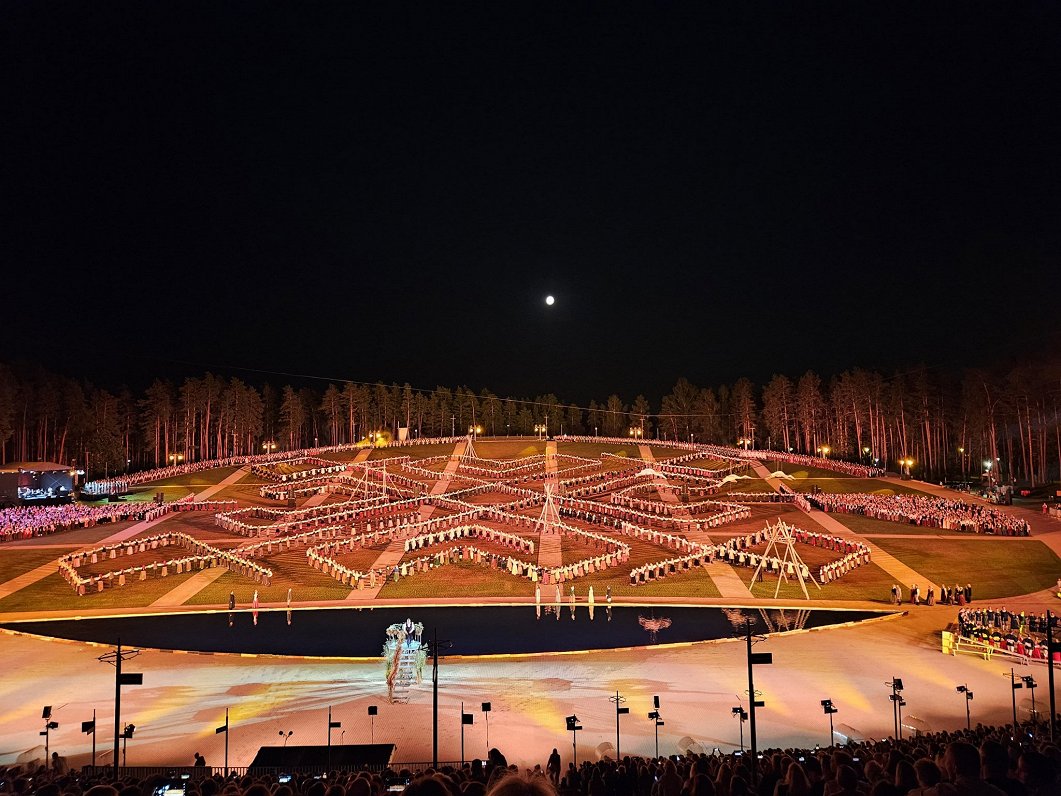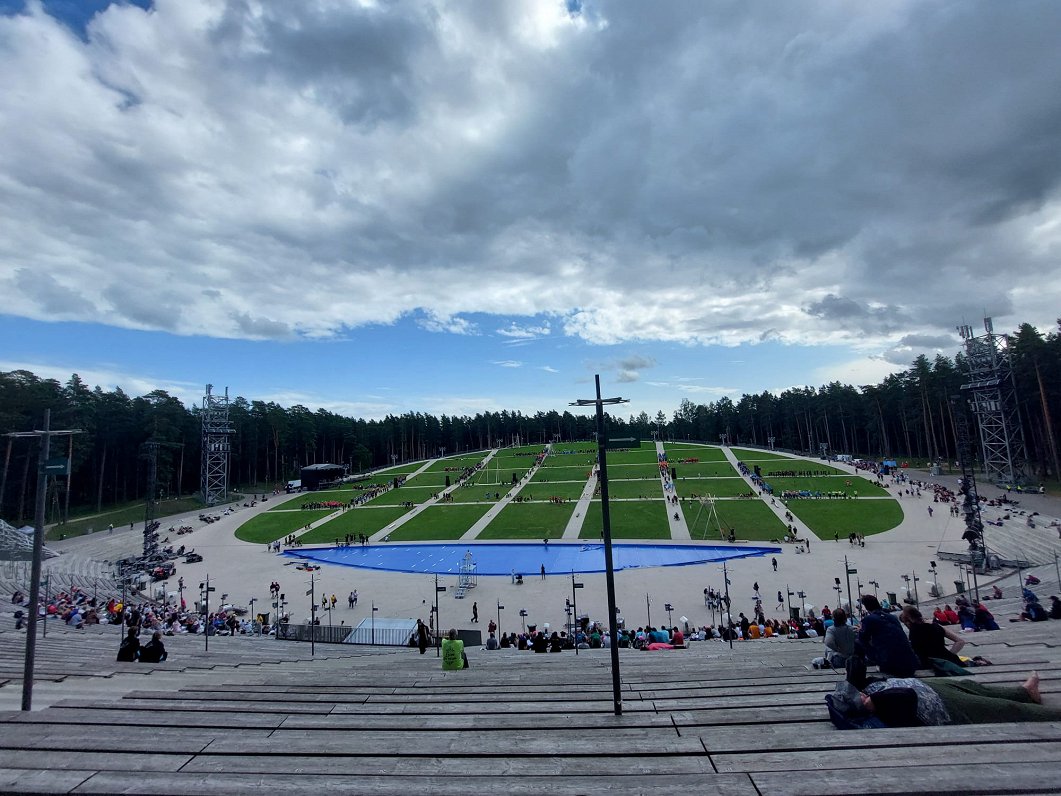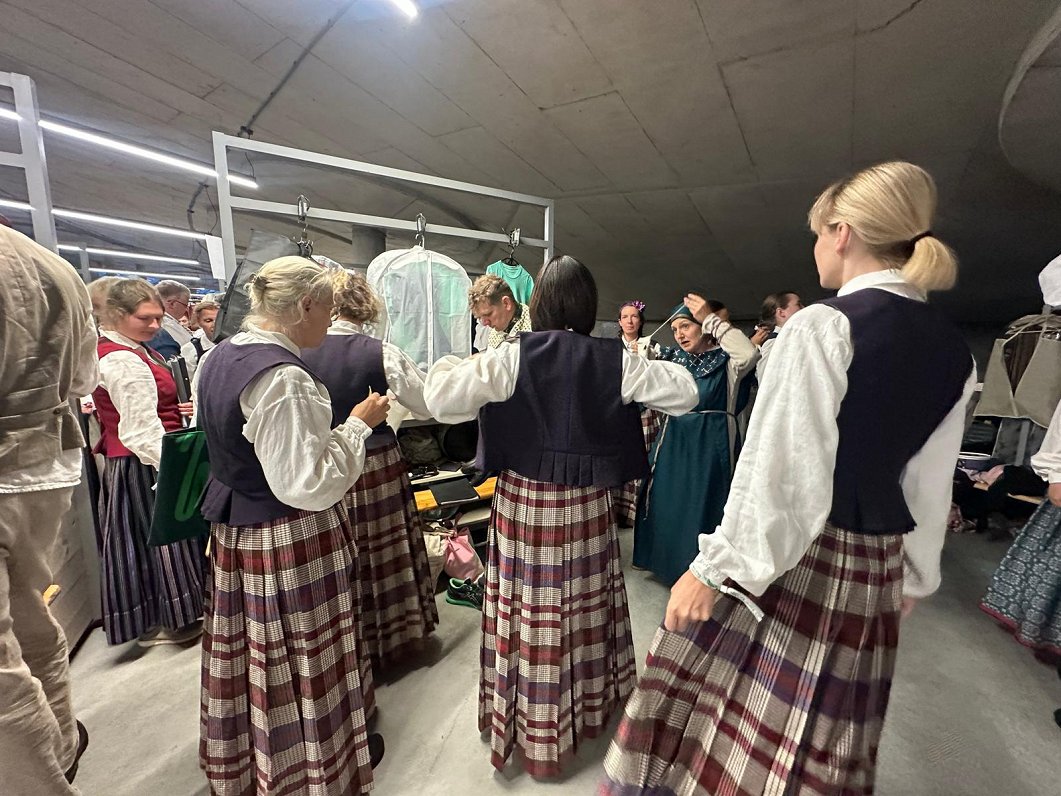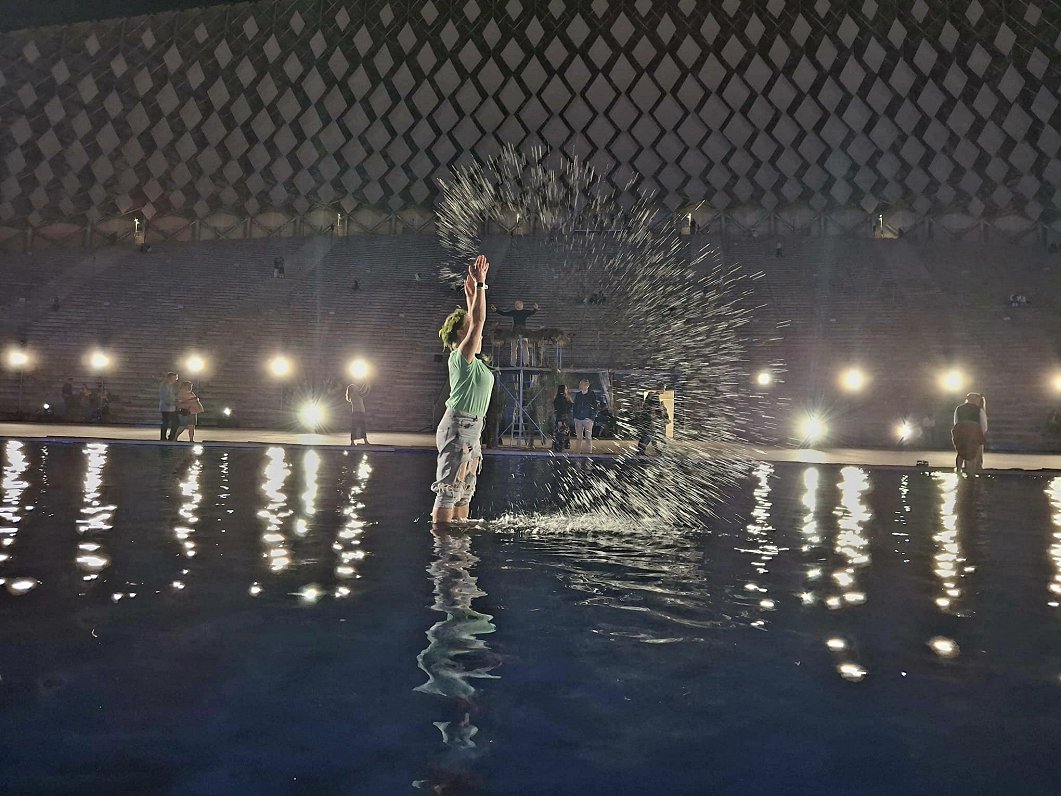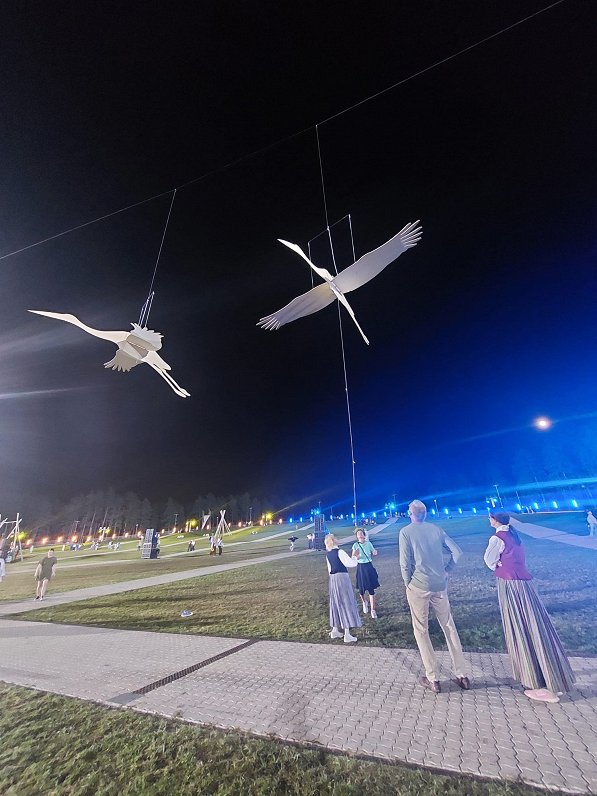Dziesma dejo. Deja skan. This chant, which translates as “The song dances. The dance rings out”, has been in the heads of at least 8,000 dancers and singers, and countless spectators this past week. On 8 and 9 August, the dance epic Düna shook and swayed the Mežaparks Stage in Rīga.
The event, where the core idea is that singers try out their two left feet and dancers let their voices ring out, took place for the first time back in 2022 and involved 6,000 participants. This year, more than 8,000 singers and dancers – 365 folk dance groups and choirs, as well as folklore groups and contemporary dance performers – joined together for a 2.5-hour journey along the Daugava river.
The narrative of the dance epic Düna is based on the story of the Daugava – also called the Düna in the oldest writings – which symbolically connects people, destinies and historical memory.
The artistic director, chief director and choreographer Agris Daņiļevičs believes that dance and song go hand in hand. He believes that singers and dancers should see themselves as a team, not as different disciplines.
“Music and dance have always been together. The moment sound recorders were invented, there was the possibility of separating dance from song. But in principle they had been together all along before, and we think that this model should be revived and merged back – dance with song. As integral parts. That’s one of the reasons why the show is called what it is,” Agris Daņiļevičs told Latvian Radio earlier.
The viewers saw a 2.5-hour performance on either Friday, 8 August, or Saturday, 9 August, evening; some also sat through the dress rehearsal on 7 August. For the participants, however, the process took slightly longer – a weekend rehearsal camp in Limbaži two months prior, four days in Mežaparks last week, as well as individual practice.
On the morning of Wednesday, 6 August, the choirs and dancers arrived bright and early – around 8:30 AM – ready for a full day of rehearsals. Some had not had their first or second coffee yet, so we went to the nearest vending machine to get it. Sounds simple, right?
Wrong. Turns out, the vending machine service team had not arrived yet, and even if they had, there was no power in the bigger part of Mežaparks, so we couldn’t get it from other vendors either. What you could get at 9 AM, was beer and cider, and plenty of it.
Determined to finish our quest, while other singers were taking the stage (this is a benefit for choir singers compared to folk dancers – nobody notices if you’re not in your spot on time), we, with our best lost puppy eyes, hiked down to the participants’ official caterers. They were nice enough to give us some of their personal coffee (although their coffee machine took some time and talking to, as well) in exchange for an invitation to our next concert. Thanks – you saved our caffeine-addicted lives.
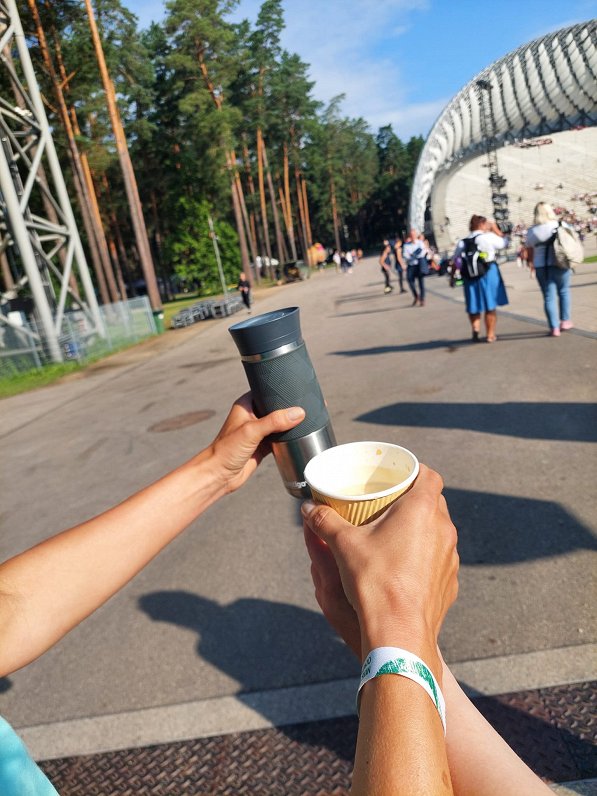
Photo: Maija Olšteina/LSM
Armed, we took our seats on the stage, knowing that it won’t be for long – in this performance, Mežaparks underwent a big swap and the stage was reserved for spectators. Dancers (mostly) danced on the grass slope where spectator benches usually are (“grass” and “slope”) are the key words here – keep in mind the rainy summer) and choirs stood (and also danced a little) on the sides of that same slope.
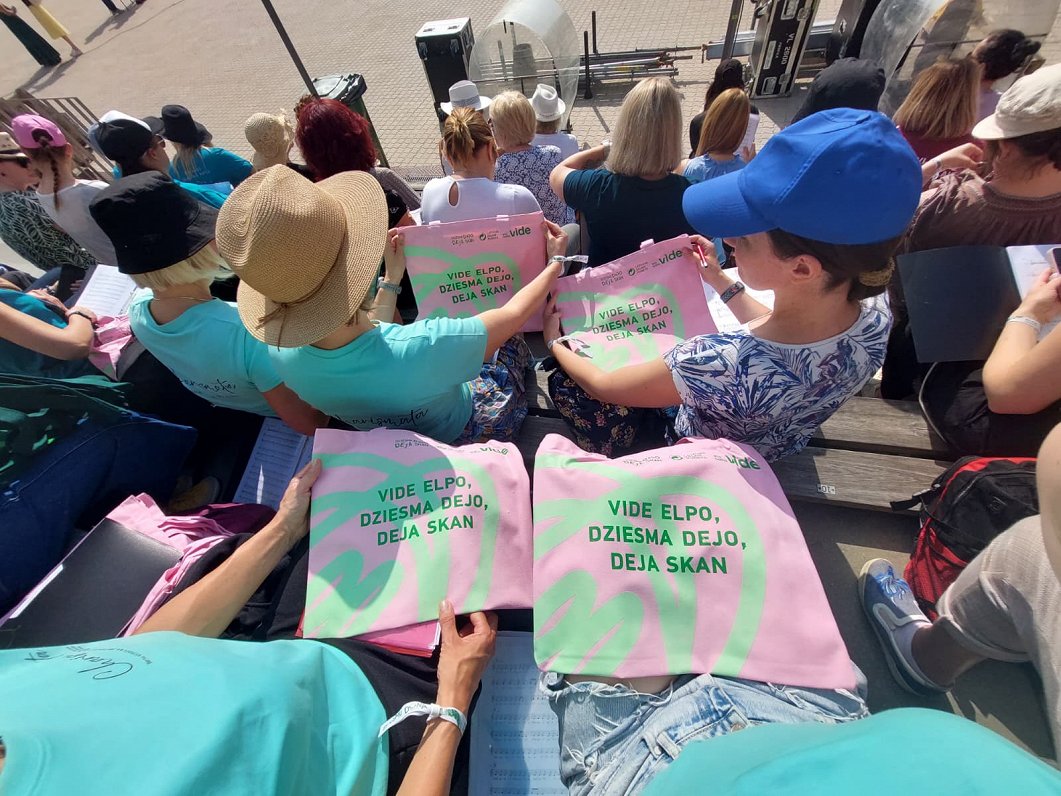
Photo: Maija Olšteina/LSM
The first day, in the words of head choreographer Agris Daņiļevičs, passed in a “beach atmosphere” – it was sunny, there were no spectators, and things were still being put together. Thursday was a different story – after a full day of rehearsals (9 AM to 8 PM; luckily, the coffee issue had been solved by then), there was the final dress rehearsal, stretching into Friday, with spectators filling about half of the seats. At that point, there should have been no surprises, but that was not the case – right before the dress rehearsal, the choirs found out that they had never been given the score for a Latgalian song (Zīdi, zīdi, rudzu vuorpa). The melody was well-known, but the lyrics took some improvisation.
The dress rehearsal was where we finally saw the outline of what was to come – how it all would look in the dark, since the performances were scheduled to take place from 9:30 PM to midnight (and they did). At that moment, we knew it was all worth it.
Yes, we still rehearsed before the final concerts on Friday and Saturday. Yes, it took a lot of time and energy. Yes, it returned the energy tenfold – and we felt it from the audience, too. Yes, we got the missing score for the Latgalian song. (Yes, we ordered the full moon right above the stage – dance group leaders can discipline even the moon).
Düna was danced and sung through the sounds of traditional folklore in modern arrangements, through the compositions of the legendary rock bands Pērkons and Zodiaks, singer Jānis Stībelis, the new indie folk rock band Idille, as well as many other compositions.
How did it all end? With a party, of course. As if we hadn’t sung and danced for four days, we continued until Sunday morning light.
